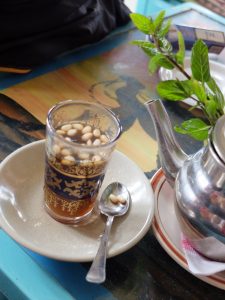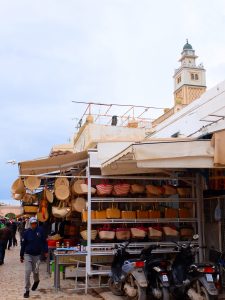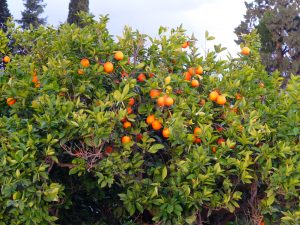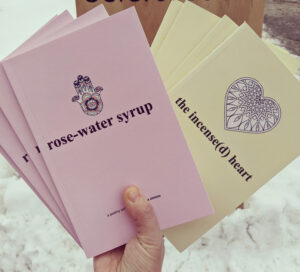 She comes from Nabeul, an approximate hour away from Tunis proper. It’s a small town, with an old traditional souq, rarely visited by tourists (much to our loss). Haifa is one of Sissina’s best friends and who, since my arrival two days ago, has been calling several times a day to ask where I have visited.
She comes from Nabeul, an approximate hour away from Tunis proper. It’s a small town, with an old traditional souq, rarely visited by tourists (much to our loss). Haifa is one of Sissina’s best friends and who, since my arrival two days ago, has been calling several times a day to ask where I have visited.
Today, she took us to her hometown of Nabeul, that I might have a taste of a more traditional Tunis, both in look and flavour. On our drive down, she and Nahid (another of Sissina’s best friends) mapped out to which cities and restaurants I must head while here, and on which nights I am to go to theirs so that they might cook traditional meals for my tastebuds. Sissina’s mother interjected during this conversation and laid first claim to feeding me outside of Sissou; no one argued.
Welcome to the glorious world of Middle Eastern (& North African) hospitality, unmatched anywhere else in this world.
Equally discussed on this drive were the traditional Tunisian dishes, and the best sha3bi (everyday working class people) restaurants at which I might find them. I am not a fan of “quatre fourchettes” restaurants; never have been and never will be. And very specifically when I travel, I seriously believe that unless you eat sha3bi food, you will miss understanding 95% of a country’s culture and history. Every dish has a story.
Based on this conversation, and as soon as we parked in Nabeul, we went to Chez El Behi, where we ate two of the three most famous dishes – S7in Tunisi, and Kafteji. I sopped up the S7in Tunisi (literally translated, it is: Plate Tunisian) without coming up for air – it is a combination of fresh uncooked cucumber, parsley tomato, onion, olives, a barely cooked egg, some harisa, and salata mashwyah (grilled and peeled hot pepper, tomato, and garlic, all crushed together). Kafteji is it’s counterpart, but all fried, so a little too heavy for me and easy to avoid. I would eat this all day, and happily be the size of a small elephant within a month, if not by next weekend.
 Interesting thing about the restaurant – they closed after they ran out of food. What an incredible concept, and what a way to ensure that there is never any waste. A lesson here, no doubt.
Interesting thing about the restaurant – they closed after they ran out of food. What an incredible concept, and what a way to ensure that there is never any waste. A lesson here, no doubt.
After feasting, we walked through the old souq and eventually ended up at a traditional Tunisian coffee shop where we had Tunisian tea, made with mint and served with fresh pine nuts which are, by the time you finish the tea, softened and sweet. Also, Arabic coffee, with a splash of fresh rose water after it is made; this flavour a first and a new tradition which I will carry back to Canada with me.
 Though there are too many memorable things to name about this day, one of the most astounding sights were the orange trees, one example of which is below, this guy just hanging out by the road. Everywhere you turn, there are trees with dozens of oranges on them ready for the picking. You don’t have to pay, just pick what you wish to eat and away you go.
Though there are too many memorable things to name about this day, one of the most astounding sights were the orange trees, one example of which is below, this guy just hanging out by the road. Everywhere you turn, there are trees with dozens of oranges on them ready for the picking. You don’t have to pay, just pick what you wish to eat and away you go.
Are they sweet? Yes; they taste like they’ve been soaked in honey and they will drip all along your forearms when you are unfolding them.
 Today, I am grateful for:
Today, I am grateful for:
1. My Khalo Nassir, in Gaza. When I am upside down about a faith matter, it is to him that I turn. We spent an hour on the phone today talking through some ideas and concerns which I had, and about which he helped me receive a better understanding. As he always does.
2. Arab generosity, as was graciously displayed by everyone mentioned above. For all of my tribe’s ass-backwardsness, and all of our very serious bipolar fuckery (which I am struggling to understand, let alone stomach), this particular generosity of spirit will never ever change.
3. Spices. Food would be cardboard and drywall without you.
Comments closed.



Recent Comments